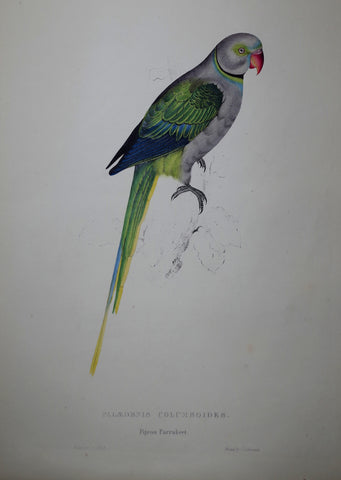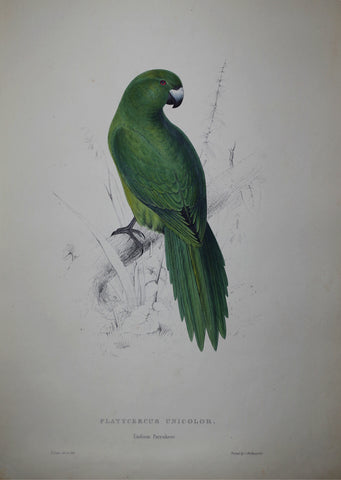Search By Artist
Edward Lear (1812-1888)
Illustrations of the Family of Psittacidae, or Parrots
London: Edward Lear, 1830-1832
Lithographs with original hand-coloring
Edward Lear (12 May 1812 – 29 January 1888) was born in Halloway, England to a middle class family. As the second-to-last of twenty-one children, he was raised by his oldest sister, Ann, due to poor family finances. Lear also suffered from epilepsy and asthma from an early age - illnesses that would plague him his entire life. Lear became a paid artist at the age of 16 when he took a job with the Zoological Society as a “ornithological draughtsman.” He continued his work drawing the private menagerie of the Earl of Derby. His publication, Illustrations of the Family of Psittacidea, or Parrots, came about in 1830, when the artist was 18. His work was favorably received and compared to contemporary artists such as John James Audubon. At the age of 25, failing eyesight caused Lear to give up his detailed ornithological work. He moved to Rome in 1837 in an attempt to bolster his poor health.
For the next 50 years, Lear would travel all over the world exploring; supporting himself through his drawings, watercolors, and writings. His travels included forays in Greece, Palestine, Egypt, India and Ceylon(modern-day Sri Lanka). While traveling he produced numerous colored wash drawings that he would later build up with watercolor and oil. To share his experiences, Lear kept detailed journals documenting his day–to-day experiences and sketched the local topography. He later annotated his journals, letters, and sketches often purposely misspelling words and adding nonsensical phrases for publication.
Lear passed away at his Italian villa in 1887 from heart disease. Sadly, none of his friends were able to attend the funeral. Great Britain marked the centennial of his death with a set of Royal Stamps in 1988 and an exhibition at the Royal Academy. To mark the bicentennial of his birth, a range of events have been planned throughout the world on May 18 – International Owl and Pussycat Day – including a Google Doodle depicting the titular Owl and the Pussycat.
This publication marked the transition from engraving to lithography in natural history works. This work contains 42 lithographs with original hand-painted color. A run of only 175 books were produced, of which only 100 survive today. The quality of this work established Lear’s reputation as one of the best natural history artists of his time.


